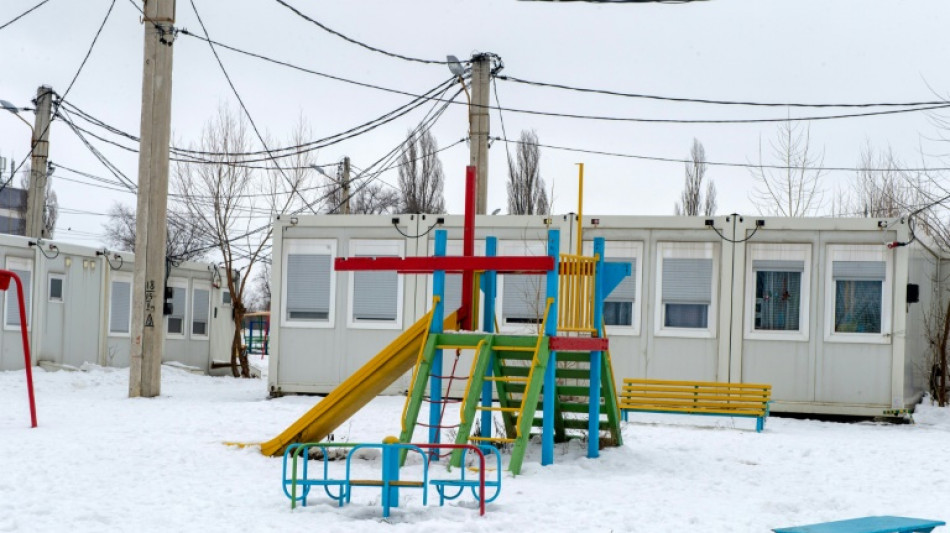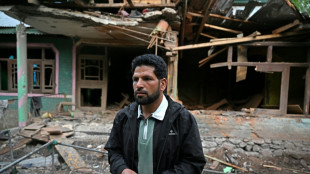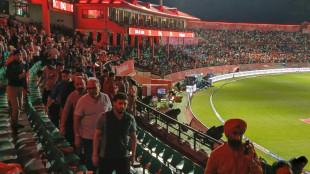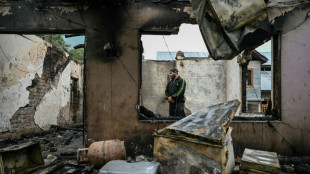
-
 Weary border residents in Indian Kashmir struggle to survive
Weary border residents in Indian Kashmir struggle to survive
-
Leo XIV says Church must fight 'lack of faith' in first mass as pope

-
 Liverpool boss Slot fears replacing Alexander-Arnold will be a tough task
Liverpool boss Slot fears replacing Alexander-Arnold will be a tough task
-
British Airways owner unveils big Boeing, Airbus order

-
 IPL suspended for one week over India-Pakistan conflict
IPL suspended for one week over India-Pakistan conflict
-
Slot says all at Liverpool sad to see Alexander-Arnold go

-
 Leo XIV celebrates first mass as pope in Sistine Chapel
Leo XIV celebrates first mass as pope in Sistine Chapel
-
India says repulsed fresh Pakistan attacks as death toll climbs

-
 Japan's Panasonic targets 10,000 job cuts worldwide
Japan's Panasonic targets 10,000 job cuts worldwide
-
Putin evokes WWII victory to rally Russia behind Ukraine offensive

-
 China exports beat forecasts ahead of US tariff talks
China exports beat forecasts ahead of US tariff talks
-
Leo XIV, the 'Latin Yankee', to celebrate first mass as pope

-
 Most stocks lifted by hopes for US-China talks after UK deal
Most stocks lifted by hopes for US-China talks after UK deal
-
IPL suspended indefinitely over India-Pakistan conflict: reports

-
 German lender Commerzbank's profits jump as it fends off UniCredit
German lender Commerzbank's profits jump as it fends off UniCredit
-
Rare bone-eroding disease ruining lives in Kenya's poorest county

-
 India says repulsed fresh Pakistan attacks as de-escalation efforts grow
India says repulsed fresh Pakistan attacks as de-escalation efforts grow
-
Zhao's historic snooker title sparks talk of China world domination

-
 'High expectations': EU looks to Merz for boost in tough times
'High expectations': EU looks to Merz for boost in tough times
-
Poisoned guests rarely invited before deadly mushroom lunch, Australia trial hears

-
 China sales to US slump even as exports beat forecasts
China sales to US slump even as exports beat forecasts
-
Indian cricket to make 'final decision' on IPL over Pakistan conflict

-
 Dethroned Bundesliga champions Leverkusen face uncertain future
Dethroned Bundesliga champions Leverkusen face uncertain future
-
China can play hardball at looming trade talks with US: analysts

-
 French monuments in trouble while PSG prepare for Champions League final
French monuments in trouble while PSG prepare for Champions League final
-
Newcastle face Chelsea in top five showdown, Alexander-Arnold in spotlight

-
 Flick's Barca must show 'hunger' in crunch Liga Clasico
Flick's Barca must show 'hunger' in crunch Liga Clasico
-
Clasico the last chance saloon for Ancelotti's Real Madrid

-
 Timberwolves overpower Warriors to level series
Timberwolves overpower Warriors to level series
-
Chinese fabric exporters anxious for US trade patch-up

-
 Putin gears up to host world leaders at lavish army parade
Putin gears up to host world leaders at lavish army parade
-
Nearing 100, Malaysian ex-PM Mahathir blasts 'old world' Trump

-
 Leo XIV, first US pope, to celebrate first mass as pontiff
Leo XIV, first US pope, to celebrate first mass as pontiff
-
Asian stocks lifted by hopes for US-China talks after UK deal

-
 Former head of crypto platform Celsius sentenced 12 years
Former head of crypto platform Celsius sentenced 12 years
-
Ex-model testifies in NY court that Weinstein assaulted her at 16

-
 Strawberry Fields REIT Announces First Quarter 2025 Operating Results
Strawberry Fields REIT Announces First Quarter 2025 Operating Results
-
Amphastar Pharmaceuticals to Present at the 2025 Bank of America Health Care Conference

-
 Ascendant Resources Announces Closing of Second and Final Tranche of Non-Brokered Private Placement
Ascendant Resources Announces Closing of Second and Final Tranche of Non-Brokered Private Placement
-
Nestlé and OMP Showcase Approach to Future-Ready Supply Chain at Gartner Supply Chain Symposium/Xpo in Barcelona

-
 Genflow Biosciences PLC Announces Share Subscription, Director's Dealing and Update
Genflow Biosciences PLC Announces Share Subscription, Director's Dealing and Update
-
Argo Blockchain PLC Announces 2024 Annual Results and Restoration of Listing

-
 'Great honor': world leaders welcome first US pope
'Great honor': world leaders welcome first US pope
-
Pacquiao to un-retire and fight Barrios for welterweight title: report

-
 Trump unveils UK trade deal, first since tariff blitz
Trump unveils UK trade deal, first since tariff blitz
-
Man Utd one step away from Europa League glory despite horror season

-
 Jeeno shines on greens to grab LPGA lead at Liberty National
Jeeno shines on greens to grab LPGA lead at Liberty National
-
Mitchell fires PGA career-low 61 to grab Truist lead

-
 AI tool uses selfies to predict biological age and cancer survival
AI tool uses selfies to predict biological age and cancer survival
-
Extremely online new pope unafraid to talk politics


Ukraine displaced fear losing homes again
When she fled the conflict zone in east Ukraine, Lyudmyla Bobova never imagined she would celebrate her 59th birthday, almost eight years later, still living in emergency housing and under the threat of fresh bloodshed.
"We have got used to living here, we don't have a choice," she told AFP, standing in the doorway of the small room she shares with her disabled husband and elderly mother.
Now, as fears swirl that over 100,000 Russian troops camped along Ukraine's border could stage an invasion, there are fresh warnings that millions more people could join the hundreds of thousands like Bobova already forced from their homes.
It was the summer of 2014 when Bobova says she hastily packed two bags and left her native Lugansk region as it was engulfed by fighting between Ukrainian forces and Russian-backed separatists.
She headed to Ukraine's second city of Kharkiv, the nearest major hub controlled by the government, in the country's largely Russian-speaking industrial east.
By early 2015 she was living in pre-fabricated housing put up in a hurry for 500 vulnerable displaced with funding from the German government.
It was meant to be a temporary solution, but years later 175 people, including 70 children, are still living in the cluster of white cubes.
The makeshift housing is showing its age. The units are creaking, taps are broken and water heaters keep breaking down more frequently.
- 'Where would we go?' -
Bobova hopes against hope that the local authorities will find a more lasting fix for their accommodation woes.
She says she can't go back to her former home where her son is buried, as it lies across the volatile front line in separatist-held territory.
And as tensions have risen over a possible new Russian offensive, she says she doesn't want to be forced to leave Kharkiv, located precariously just 40 kilometres (25 miles) from the border.
"We had to live, so we fled, my mother was still walking with her cane but now it's difficult and my husband's health has deteriorated," she says.
"And where would we go?"
The Ukrainian government says that some 1.5 million displaced people have been registered around the country since Moscow seized Crimea and war broke out in the east in 2014. Around 135,000 of them are in Kharkiv.
The Norwegian Refugee Council has warned that up to two million people living along the 427-kilometre front line risk being forced from their homes if the conflict escalates.
Activist Yevgenia Levenshtein remembers how hundreds of displaced arrived at the Kharkiv train station back in 2014 "with nothing, families and children, in tears, from the areas being bombed".
Her association, Ukrainian Frontiers, provided emergency aid -- hygiene products, food, housing, work -- to the newcomers.
Given the recent warnings, the organisation has started to prepare again for a fresh wave of evacuations by repairing its minibuses, stocking up on fuel and ordering basic necessities.
- 'Shelter' -
Some who fled the violence have returned to their homes in the self-proclaimed separatist "republics" despite the low-level fighting rumbling on.
And those who remain behind in Kharkiv have strong pro-Ukrainian views.
"They chose Kharkiv for their new life, it's their shelter," says Levenshtein.
"They are ready, at least for now, to stay and defend it. But how? That's a mystery to me."
This is the case of Olga Todorova, who still has tears in her eyes when she tells of how she fled Lugansk by train to avoid separatist checkpoints on the roads.
In the room she rents in a Soviet-era building on the outskirts of Kharkiv, the 53-year-old journalist says she has already made up her mind what to do in case of a Russian attack.
"I know how scary it is, the Russian bombing and mortars or missiles, but we won't leave," she says.
Her partner Sergiy Kolesnyshenko, who was detained and beaten by the separatists, says he is ready to join the reserve forces in case of a Russian attack.
"How much time can we spend running away?" he asks "We can run away but what's the point?"
P.Stevenson--AMWN